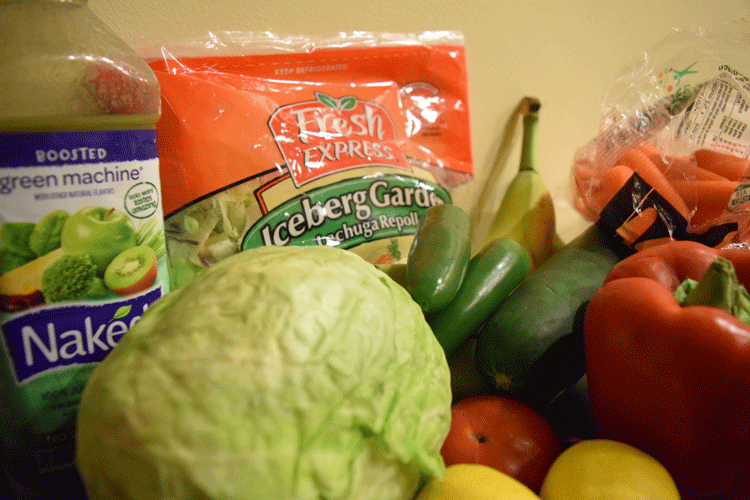Living Vegetarian
May 1, 2015
People are drawn to vegetarianism for multiple reasons. Some commit to vegetarianism for health benefits or to protect the environment. Others adopt the meatless lifestyle simply because they are ethically opposed to eating animals.
Vegetarianism can generally be broken into three major categories:
- Lacto-ovo vegetarian – This is the most common vegetarian diet. These type of vegetarians consume dairy products and eggs but do not consume fish or meat.
- Lacto-vegetarian/Lactarian – These type of vegetarians consume dairy products but abstain from eggs.
- Vegan – These types of vegetarians exclude any products that can be obtained from animals.
Junior, Maggie Grace committed herself to vegetarianism when she was in second grade. Grace decided to become a vegetarian after someone told her “hot dogs are made from pigs and [she] thought it was disgusting.” After almost nine years, Grace says she is content with having a vegetarian diet, “I think being a vegetarian keeps me from gaining weight.”
While there are people who adopt the vegetarian lifestyle in later years, there are also people who are vegetarian from birth because of religious faiths. One such person, sophomore Priya Patel believes that “Being vegetarian, people think that you’re limited to just salads. In reality, there’s millions of dishes out there that are more nutrient enriched than regular [non-vegetarian] meals.”
As American’s become increasingly more health conscious, switching to vegetarianism seems to be a growing trend around the area. Many restaurants have adopted different types of vegetarian dishes and/or offer options where one can just order a dish without the meat. Senior Charles Bond, a vegetarian since birth, said that “Sometimes it’s difficult finding decent vegetarian dishes at restaurants, but not always. Fast food chains like McDonald’s and Wendy’s are the toughest to find food at.” Grace had similar views about finding reasonable vegetarian dishes outside of home, “It’s hard finding vegetarian options at restaurants around here other than salads.”
When it comes to vegetarian diets, myths abound. One common myth is that vegetarians do not get enough protein. Of course this varies from person to person, depending on their diet. “A lot of red meat is filled with saturated fat which is terrible for your body, and I don’t have any problem getting my protein from sources other than meat,” said Bond. According to Exos Knowledge, meat does not have a monopoly on protein. In fact, a wide range of foods contain at least some amount of protein, including grains and vegetables.
Another common myth is that vegetarians suffer from weight loss or poor athletic performance. Not all vegetarians are slim or even healthy. A vegetarian diet can still have the same effect on ones performance as long as they are receiving nutrients from other sources. Junior Isaiah Walcott does not believe committing to vegetarianism has affected his health. “There are still other non-meat sources of protein and every other food is the exact same for me as it is for non-vegetarians,” said Walcott.
While being a vegetarian isn’t for everyone, Bond suggests to anyone contemplating switching to a vegetarian diet that they get a friend to do it with them. “Don’t starve yourself, but try eating healthier and finding vegetarian food that you like while also exercising more. This combination of not feeling like you’re in it alone, and also knowing that every day you commit yourself to being healthier you’re one step closer to that killer body you’ve always wanted should help you through the first few weeks, which is the hardest time.” Grace echoed Bond’s advice saying “do it gradually because some things can be really hard to give up all at once.”




